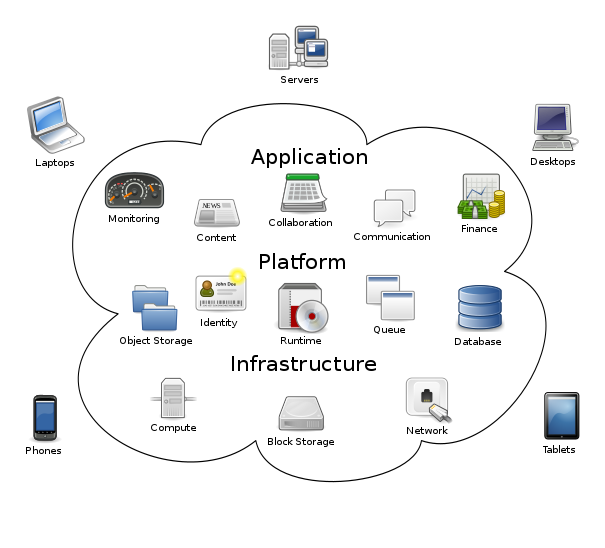Monday, October 11, 2010
Cloud Computing: Is there a threat?
During the LinuxFestJo event last Saturday, I had a chat with Noha Salem, an Egyptian Googler, about Google's upcoming agenda and future plans for the IT industry. Everything she said was pretty interesting, until she reached the issue of cloud computing. She argued that cloud computing is certainly the trend of the future, which is somewhat true. However, what raised my suspicions was when she claimed that the cloud is going to totally, but slowly, replace the desktop, to the extent that desktop applications will slowly become obsolete and unsupported over time. This this is where I'd like to declare my stance against Google, and/or any other company, firm or organization which adopts such views for the future of computing.
Perhaps the most sensitive aspect in the issue of cloud computing is the issue of privacy and personal security. Personally, I have no idea how storing all my personal data and personal files (images, documents, audio and video stuff) on some server located somewhere on another continent can be even remotely as private, safe and secure as storing them on my personal machine and then sharing them with the world as I wish. The irony is that when I tried to tell Noha that there will be many people who will refuse to place all the personal stuff on the cloud, her only response was something like: "Oh, of course there will be a great consideration for personal preference!". But then, how is there going to be any kind "relevant" personal preference when the ability to store files and data on a completely isolated machine will not be available anymore? In my opinion (please correct me if I'm wrong), cloud-hosting service providers can brag all they want about the levels of privacy and security they provide, but the fact remains that the cloud will never be even half as trustworthy, when it comes privacy and security, as the desktop.
Another critical issue about cloud computing has to do with the fact that internet speeds vary from one country/region to another. Here in Jordan, for example, internet speeds could barely exceed 10mbps (which, by the way, is not even remotely affordable by middle class citizens). However, in other regions in the Arab world on the other hand, such as the UAE, internet speeds reach as high as 30mbps, especially with the new eLife service provided by Etisalat. Moreover, what about those who can't afford an internet connection altogether? You're not trying to convince me that we'll have completely defeated the entire world's poverty by the time the cloud computing trend takes the lead, are you?
Conclusion, it's not that I'm totally against cloud computing. Of course not. I actually think it's a great technology; but I am, however, against the idea of total migration to it, to the extent of totally flushing the desktop down the toilet. I believe that balance is always the best thing to do.
Subscribe to:
Post Comments (Atom)


It's UAE (United Arab Emirates) not UEA ;-)
ReplyDeleteOh! Sorry.
ReplyDeleteFixed it. Thanks. :)
Great article, and you've covered most of it. I totally agree with you on issues of security behind cloud computing, it is not welcome when it comes to that, but unfortunately it seems the whole world is taking direction towards accepting less privacy whether we like it or not. RFID chips, Facebook, lots of valuable information about almost anyone online these days, you name it. I think it's a battle already lost big time.
ReplyDeleteRegarding connection speed in countries, cloud computing can only replace local computing when internet connection speeds pick up world-wide and become par together. Which I believe won't take long anyways, perhaps it's 5-10 years before we can have our own 100mbit and who knows perhaps 1gbit lines.
While it sounds so good to be true that one day you'll be able to access your files remotely somewhere in Europe/US faster than accessing your own local files on your hard drive, and it sounds awesome that some people are already working on GPU and CPU pools for use REMOTELY, I still fear that it will put send humanity back in the digital age to days before it even existed.
Very well guided.Through cloud hosting, an organization can avail cost effective servers that are completely secure and possess load balance feature.
ReplyDeletesheena
Maybe it will not replace your desktop totally, but it will be there as an option for people who don't care about privacy, or their work doesn't contain any private data, from my point of view.
ReplyDeletethe cloud is already mastering some of the fields right now, or lets say in the way to master it, for example Online Backup, of course it will be encrypted. and there are something called "Render farms", now they are available online, instead of providing your company with super computers, you just rent one online to do the work for you and give you the out put.
and about the privacy, I agree with some of yazeeds points, most people put their valuable information online, that certain people on facebook will have access to see it, and facebook admins can access it easily ! a couple of years ago you couldn't even delete your account , I don't know if you can now.
after all what i said, I can say that I don't have facebook for the same issue you are talking about with is privacy.